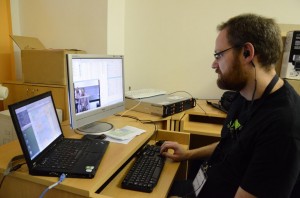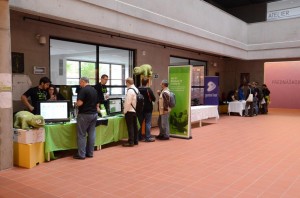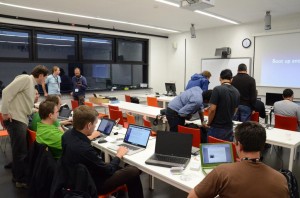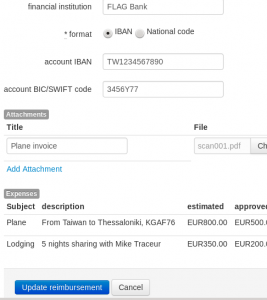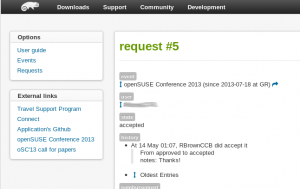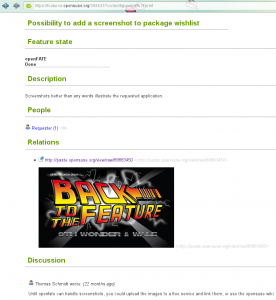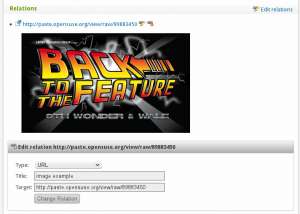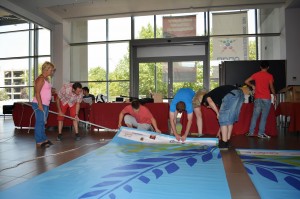
So, the openSUSE Conference is well over now and most people must have recovered by now. The Greeks, having a very active openSUSE community, were first to organize an openSUSE Conference outside of the safe SUSE Towns Nuremberg and Prague! With only a little practical help from SUSE, they brought together almost 300 people in Thessaloniki. A stellar job in every way! (more…)
Archive for the ‘Boosters’ Category
openSUSE Conference is Over!
August 2nd, 2013 by calummaMerchandising
July 11th, 2013 by calumma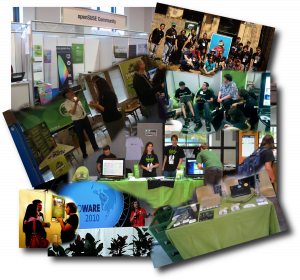
This week, we have team member Jos Poortvliet talk about what he’s been working on in the merchandising area.
A bit of history
The openSUSE Ambassador program was started by my predecessor Zonker to support volunteers who wanted to represent openSUSE at events. I really liked the idea and worked with many people to build it up further. This has been quite successful and we’ve had a presence at hundreds of events over the last years. (more…)
Numbers is openSUSE
July 4th, 2013 by calumma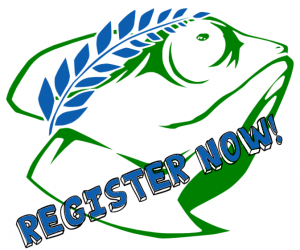
The 18th of July the openSUSE Conference 2013 will kick off in Thessaloniki. As always there will be many talks about the technologies on which the openSUSE distribution is build as well as workshops where one can learn further tricks. However, the conference also provides an opportunity to talk about the project itself. There will be a Project Meeting, various sessions on the Ambassador program and many development teams will meet and discuss their work.
The openSUSE team will go a little more ‘meta’ with a presentation about numbers about openSUSE. Alberto Planas tells you all about it! (more…)
The openSUSE Team at oSC13
June 27th, 2013 by calumma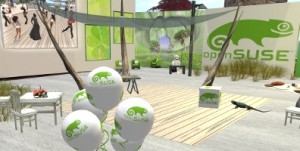
This edition of the openSUSE Conference is unique in many ways. If you’ve read the recent blogs by main organizer Kostas and openSUSE team member Jos Poortvliet reminiscing about the history of our conference, you know what we mean. Until now the former Boosters (and now openSUSE team) and some other SUSE employees were the core organizers of the event. This year, we’re in a far more supportive role. In this post we’d like to detail some of the things we’ve been working on!
Finance and administration
Of course, like previous years, SUSE is the Platinum sponsor of the openSUSE Conference. But we don’t just give money, we help spend it. We provide administrative and legal support to the organization team, helping execute tasks like dealing with providers, venue and sponsorship contracts, payments and more. Several departments at SUSE are involved in these activities internally coordinated by the openSUSE Team at SUSE and in particular by Agustin.
There is an important part of the administrative and financial support provided by SUSE related with the Travel Support Program. The openSUSE Conference is the most relevant community action openSUSE organizes so the workload related with this program increases this time of the year, specially this edition that the financial support has been doubled compared to the previous one. A report about the TSP will be publish during oSC13 by the TSP Comittee so you will get all the details there.
Technology: video, network
We are preparing the video coverage for this years oSC like we did it in 2012. That means we are recording all the talks of the three main rooms and we’ll try to publish them as sooon as possible. However, due to the reduced manpower of this years video team we might not be able to publish them on the day after. We’re aiming for perhaps during the week after the event.
Additionally we will provide live video and audio streaming of the talks worldwide. So even if you are not able to come to Greece you will able to see the talks you are interested in. And if you’re at oSC you could even try to attend two talks at once if you bring a video streaming capable device. The local team will try to make sure that the room chairs share questions from people joining remotely with the presenters.
SUSE also provides networking expertise in the form of Lars Vogdt, who’s also in charge of infrastructure in the Nuremberg and Prague offices and took care of networking for oSC12.
Marketing and communication
A conference needs lots of communication over lots of channels and this is where community manager Jos Poortvliet helps out. There’s of course the main website, set up by Henne Volgelsang. Jos has done a fair bit in writing texts for it as well, helping Henne in maintaining the site with tasks like adding the sponsors when they came in or speakers for the program. Jos has also written or edited the majority of conference articles for news.opensuse.org, announcing things like the start of the travel support program request period, the Call for Papers, the program, sponsors, keynote speakers and more. Some of these were send out on our press channels.
Speaking of Press, Jos has tapped into his pool of press contacts, inviting journalists for the conference, helping to organize Media Partnerships and interviews. At the event, he’ll take care of the press, help them find people to interview and make sure they have a place to quietly work. He’ll also coordinate the communication, with help from the local team, making sure we send out tweets, facebook and Google-Plus messages and of course daily articles informing those who didn’t make it to the event about what is going on.
Content
Michal Hrusecky was active for the openSUSE team on the CfP committee. That was in part due to his expertise as main organizer of the openSUSE Conference 2012 but also because the openSUSE team as a whole is committed to provide content for the conference: each member will perpare presentations and workshops, sharing their knowledge and experience. Michal coordinated this and made sure that if the CfP team saw gaps in the current proposals, the openSUSE team would attempt to provide the desired content. For example, Michal and Jos will provide daily “how to give awesome presentations” workshops.
Just part of the machine
All these activities represent a small fraction of the effort needed to organize such a conference. The heavy work is done this year by openSUSE community, specially by the local team lead by Kostas and Stella, among others.
The openSUSE Team, together with some other members of the Operation, Services and Communities department, are coordinating and/or executing most of these tasks assigned to SUSE. We are not the only ones, since other SUSE employees involved in openSUSE are helping in many different areas, like usual. But is the community who leads the event organization.
For SUSE, as you can imagine, it is easier to provide support close to any of our offices than in other countries. So we are open to have openSUSE Conference again in Nuremeberg or Prague in the future. In any case, our commitment to the openSUSE Conference is clear no matter where it take place.
The openSUSE community is getting mature so our relation as company with the project has to evolve. This new role that SUSE plays in the openSUSE Conference organization is just another sign of this evolution.
Statistics
And here then the statistics we promised two weeks ago and forgot last week… The top ~10 contributors to Factory last week, AND the list from the week before!
The top-10 contributors to openSUSE Factory in week 25:
| Spot | Geeko |
| 1 | Sascha Peilicke |
| 2 | Stephan Kulow |
| 3 | Jan Engelhardt |
| 4 | Vincent Untz, Marcus Meissner |
| 5 | Dirk Mueller |
| 6 | Joop Boonen |
| 7 | Wolfgang Rosenauer, Robert Milasan, Dinar Valeev |
| 8 | Michal Hrusecky, Michael Calmer, Cristian Rodríguez |
| 9 | Wolfgang Bauer, Ruediger Meier, Petr Gajdos |
| 10 | Tobias Klausmann, Stefan Dirsch, Johannes Weberhofer |
The top-10 contributors to openSUSE Factory in week 24:
| Spot | Geeko |
| 1 | Stephan Kulow |
| 2 | Jan Engelhardt |
| 3 | Dr. Werner Fink |
| 4 | Marcus Meissner |
| 5 | Togan Muftuoglu, Sascha Peilicke |
| 6 | Cristian Rodríguez, Andreas Stieger |
| 7 | Charles Arnold |
| 8 | Dinar Valeev, Bjørn Lie |
| 9 | Michal Vyskocil, Ismail Donmez, Bruce Rogers |
| 10 | Tomáš Chvátal, Michal Hrusecky |
The openSUSE TSP application
June 20th, 2013 by calumma
Today, Ancor Gonzalez Sosa writes about the Travel Support Program Application he developed with the openSUSE Team.
Traveling to an event to represent your project, sharing experiences with other people with common interests and showing them what you are passionate about is absolutely awesome – but it can get expensive. This is why openSUSE introduced a Travel Support Program last year.
The openSUSE Travel Support Program
The goal of the Travel Support Program is to support contributors representing openSUSE at events by reimbursing up to 80% of the travel and/or hotel costs. In turn the contributors make a worthy contribution at the event and report back to the openSUSE community about what they did.
We’re not alone in doing this, having drawn inspiration from GNOME’s Conference Travel Subsidy Program, the KDE e.V. Travel Cost Reimbursement initiative and the Travel Policy from The Document Foundation.
The program is sponsored by SUSE, but the Travel Committee independently manages the money and decides who is supported and how. This is a lot of work: decisions involve the event itself, the contributor asking for support, other Geekos in the area, the costs and of course the entire budget. The team also has to plan the priority of events with the marketing team and communicate about the status of the requests and reimbursement.
And the Free Software world was lacking a proper tool to manage all this… until now!
The brand new TSP application
We developed a new web tool to make the life of the TSP team and the community easier and do this in an open and generic way so other projects could benefit as well. We’ve started using it already for the upcoming openSUSE Conference 2013 and you can see it in action here. It even offers a pretty diagram explaining the TSP process! Of course, the complete source code of the project can be found on Github.
Development
For a more detailed explanation of the goals of the project you can refer to the ‘about the TSP application‘ page in our projects management tool. In that page you will find ‘the 6 Ws’ of the new application: who, what, when, where, why and how (yes, we know that ‘how’ does not start with ‘W’, but we didn’t invented the 6Ws term).
During development we honored the motto “release early, release often” and worked following agile development principles. We begun by collecting ideas and requirements of the TSP team and the people handling the payments on the SUSE side. After developing a first prototype, it was presented in a video conference. You can find the minutes of this meeting in the project’s wiki.
Once the feedback was in and new goals were set, the prototype was deployed on a provisional server in order for the Travel Committee to test it. Using this test-drive installation, the application was improved in an interactive way. Every two weeks (sometimes a bit longer), a new version was installed. Izabel tested the new version providing very useful feedback used to plan the new milestone in our projects management tool and so on. This cycle is still in motion: new version, feedback, planning, new version…
Awesome Rails goodies
While working on the TSP application we have developed some features that can be interesting for other Ruby on Rails programmers working within the openSUSE infrastructure, like the team behind OSEM. The TSP application includes a Devise backend for the openSUSE authentication infrastructure, a Bento theme for Bootstrap (written in pure Less) and integration with openSUSE Connect through its REST API. We plan to release all these features as individual components to allow reuse in other openSUSE developments.
Present and future, sharing with others
We plan on continuing maintenance of the application and as with most free software projects, it’s hard to predict in which direction the tool is going to evolve. Conference volunteers in charge of the visa invitation letters and the team in charge of merchandising shipping already made some interesting suggestions so it will not be a surprise if we end up developing a full event management tool. Not for registration and scheduling individual conferences -the oSC’13 guys are already doing a great job developing OSEM– but for the administrative tasks and planning behind the attending various events that communities like openSUSE do.
Concluding
So, if you are an openSUSE contributor and you might need sponsorship for traveling in the future, bookmark the TSP page! If you are a Ruby on Rails developer, just Fork it on Github™ and meet us at oSC’13 to talk about future collaboration. And if you are in charge of a travel support program for another open source project or are thinking about the possibility of starting one, you can run it yourself and we’d be happy to help you in case of trouble. You can find me (Ancor Gonzalez Sosa) as ancorgs in the openSUSE-Project channel on Freenode.
And always remember: have a lot of fun!
Keeping Factory in shape
June 13th, 2013 by calummaMichal Hrušecký has been helping out on maintaining Factory in shape and shares his experiences.
Factory is development version of openSUSE and it is where the next openSUSE is taking form. Hundreds of packagers send packages into Factory to be integrated as a part of the new release and many more use Factory for testing or for their daily work. Thus it is really important to keep Factory rolling and usable. Everybody knows that Coolo is the Factory master and he does everything to make next openSUSE be the best ever. But keeping factory in shape is really complicated and stressing task. There are dozens of request everyday and each one of them can potentially break something. So Factory can always use a pair of extra hands and for some time I have been one of them. I’d like to give you some insight in what we do, working on keeping Factory building and working. (more…)
Presenting the openSUSE Team Blog!
May 30th, 2013 by calumma
On April 6th and 7th the openSUSE Board had a meeting at SUSE offices. Vincent Untz, chairman of the board, asked me to participate in the meeting. He also invited several other SUSE employees that have internal responsibilities in different areas relevant for the community project. Among the requests made by the openSUSE Board to us as openSUSE team was to increase the communication about what we are doing beyond the reports we were sending to the project mailing list every once in a while.
I think that it was a good request. The openSUSE Team at SUSE have been working on tasks that will bring some noticeable results for the project. But most of those tasks are not visible to many in our community. This blog can help mitigate that.
Team blog
The fact that much of what we have been doing lately is not very visible has a lot to do with the nature of our current focus. We felt there was a need for going back to basics in some areas, in order to re-structure them in a way that makes us stronger in the future. We have been planning (like the merchandising program), improving and building openSUSE tools (openQA, TSP site), focusing on the release and in short – preparing. This new approach reinforces the commitment SUSE has in openSUSE, not the opposite.
To communicate what we are working on, both in terms of planning as well as building and developing, we returned an idea we discussed several months ago, the creation of a team blog focused on describing our actions.
Changes
As you probably know by now, SUSE decided almost a year ago to make internal changes to better address new challenges around openSUSE. The openSUSE Team at SUSE is one of the results of such changes. Currently it is formed by Alberto Planas Domínguez, Ancor González Sosa, Christopher Hofmann, Ludwig Nussel, Jos Poortvliet, Max Lin (temporary assigned to other department), Michal Hrusecky, Stephan Kulow, and myself. Another engineer will join us in July and we have two openings, a senior KDE developer and a graphical designer. Hopefully, together, we can make a real difference and get some great things done!
If you are interested in what we are doing we hope you enjoy reading this blog. We will put a sustained and collective effort on it the following months. There are other teams in openSUSE doing great things that will benefit from more visibility. We hope some of them follow our example!
Agustin Benito Bethencourt
openSUSE Team Lead at SUSE
Note: Comments on our blog will be moderated following the project Code of Conduct.
Geeko says: Hey dude, that’s my car!
October 9th, 2011 by Bruno FriedmannImagine it!
A few months ago, I’ve started to look for my next car. Then a crazy idea emerged, why not a Geeko’s car?
Find it!
At that time Gilbert my mechanic [www] told me that Ford will get a new Fiesta model called Sport+ with a more powerful engine, a new look & feel. I went to the exhibition and made a short test drive. The car was cool. The exhibit model was in blue with 2 white stripes.
Blue? Green would have been cool isn’t it?
openFATE News
September 21st, 2011 by digitaltommWe just added 2 new goodies to our feature tracking tool openFATE:
Print views
You can now get a decent view of a feature that is adapted for printing. Either click on “Print preview” in your browsers menu, or on “Print” in the feature export box on the right side of your feature.
Adding inline images and screenshots
To add a screenshot or any other image included in your feature, just add a relation with type “url” that points to your image in the net. You can for example upload it to paste.opensuse.org or any other image hoster.
openSUSE Conference 2011 Schedule Available
August 17th, 2011 by Klaas FreitagIts quite some work to get to a reasonable schedule for a FOSS conference done. You want a balanced program with topics where all visitors can find their interests in. Moreover the level of the talks must be taken care of as well as there should be gravitation centers for key topics within the community. As you usually also seek out for new community members with a conference, some topics which attract new people are also a very good idea. And all that needs to be sorted between rooms with different sizes, the times people can be around, the tracks you think are useful on the event and such. Quite some parameters to take into account.
That said, I am very happy that we could issue the schedule for the openSUSE Conference 2011 today.
For conference organization there is tooling. Or should I say: Should be? Given the huge amount of FOSS conferences around, the number of free alternatives of conference organization systems is fairly small. We decided to go again with Indico, a python based system developed by CERN. It provides support for the whole conference life cycle such as the call for abstracts, the internal judging process, the scheduling and such. With nice help from the developers we got it running smoothly and integrated. Sometimes the interface is not really straightforward, but finally its a very feature rich yet flexible tool that feels like it has managed some large (CERN) conferences already.
For the openSUSE conference 102 contributions were scheduled into four rooms in four days, so it will be quite a exhausting event :-). Unfortunately we still had to reject quite some submissions as the program is stuffed already. Please bear with us.
This year we are really happy to have a joint event with the former SUSE Labs Conference for the first time. That not only brings a lot of high potential speaker to the event, but also much more low level topics around kernel, gcc and such. I think we lacked that a bit at the last conference. Also cool that Greg KH, well known kernel hacker, will enlighten us with a keynote.
Beside the low level topics, we will hear a lot about community affairs, such as social skills for geeks or impressions from our ambassadors work. Another big block is around packaging and the organization and management of openSUSE Factory, our next stable distribution. Some knowledge sharing is always appreciated, I personally look forward to “Working Effectively with GIT” as I am still dreaming of svn in the nights 😉 And what we need to continue to grow our identity as openSUSE project are contributions around our setup and the relationship to SUSE, the commercial offering of SUSE and the importance of openSUSE in that. Michael Miller, SUSE Vice President of Global Alliances & Marketing, will give a keynote here, and there are other talks in that space.
The motto of osc2011 is rwx³ which is a synonym of the idea of interactivity and creativity on the conference. That is a success already as more than the half of the contributions to the conference are BoFs, Workshops or hacking sessions. You do not have to fear to fall asleep in lengthy talks instead you will do stuff 😉
And finally there is the venue. If you have been to the conference last year I need to say its different this year. Nobody will serve you Coke, instead with Zentrifuge you are at a place where usually artists work and do exhibitions. This spirit of hands-on work quickly jumped over on us as the orga team and we are sure that spirit is good for openSUSE 🙂
I hope you have registered for oSC 2011 already….

